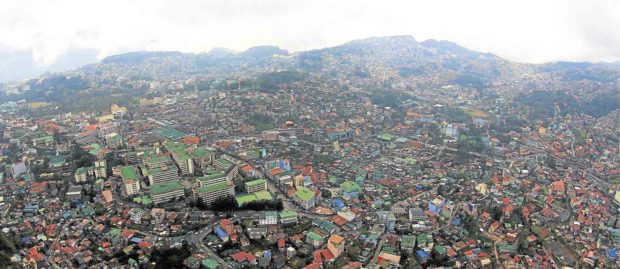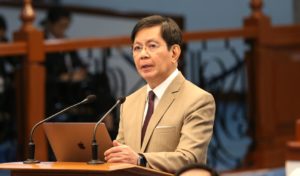
CROWDED CITY The Baguio City government has been dealing with problems related to housing, resource use, traffic and waste management as migrants, workers and students continue to crowd the summer capital. —EV ESPIRITU
BAGUIO CITY, Benguet, Philippines — An amnesty program allowing property owners with no land titles or building permits to have access to electricity and water may have helped increase the number of informal settlers here, a building official told the city council recently.
The council was deliberating on a new ordinance that would continue a 2016 amnesty which allowed informal settlers to have electricity and water supply while they applied for permits or clearances to legitimize their property.
Amnesty program
The previous amnesty required the city building and architect’s office to issue certificates of electrical installation to people who lived in houses that were built without permits.
But city building officer, Nazita Bañez, cautioned the council about granting new amnesty, saying the previous ordinance appeared to have encouraged more people to build houses on critical slopes, forests and government lands.
Bañez said the new amnesty could run counter to the proposal of Mayor Benjamin Magalong to impose a moratorium on building constructions to give the city time to correct policies that had affected the environment.
About 9,000 illegally built houses benefited from the 2016 amnesty, she said, and that number may increase if a new amnesty is approved.
Humane treatment
Some shanties, which the government allowed to have power connections, were not even habitable, Bañez said.
The city government had adopted six amnesty ordinances in recent years.
These ordinances were aimed at treating squatters humanely by granting them access to vital resources, said Councilor Joel Alangsab, one of the sponsors of the proposed amnesty ordinance.
Like the 2016 amnesty, the proposed measure does not condone squatting and may not be used as a legal shield should the city government order the demolition of illegal structures, he said.
Some councilors supported Bañez’s proposal to bar structures on slopes from availing of the amnesty. Her office is conducting an inventory of houses or buildings in danger zones and those put up without soil and geological evaluation. —Vincent Cabreza


